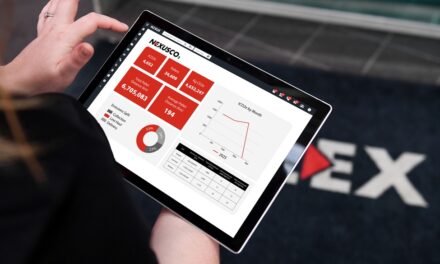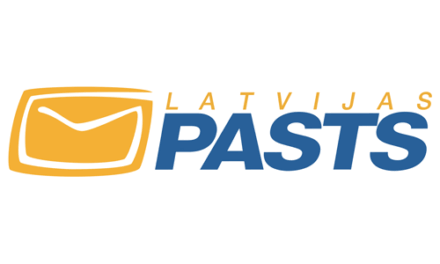
Aiming to be the first choice for the Latvian People

Post & Parcel speaks to Beāte Krauze-Čebotare, CEO of Latvia Post. Beate is determined to kickstart the transformation of Latvia Post at the same time as preserving its heritage with the creation of a Postal Museum.
Can you start by telling me how you got into the sector?
I spent 11 years in the banking industry at Swedbank AS, but over time, I saw the industry wasn’t growing as rapidly as before and was becoming more and more regulated so I started looking for something more challenging. I was drawn to the logistics sector when I saw an advert to work as a General Manager at Omniva. I really believed in the service they were providing – installing parcel machines across all Latvia – and I was excited to work in a growing e-commerce market.
You became CEO of Latvia Post in August this year, what drew you to this role?
I spent six years at Omniva and the company evolved and grew rapidly during the time. I was there to make Omniva a market leader in all categories – from parcel volumes to customer service quality. As Omniva was planning an IPO in the Baltics I knew my role as a Country General Manager in Latvia would be phased out, so when I received an offer from Latvia Post to become CEO it was great timing.
What are your key plans for the post’s transformation?
We are a bit behind other players in terms of transformation so one of the key things we are planning to do is to decrease the number of postal offices we have and install more outdoor parcel lockers and increase the number to 400 parcel machines in Q1 2024. By Latvian law we have to have 25 post offices in Riga city – our capital – so they will remain. But we are trying to adjust the number of our regional post offices according to the actual demands of our customers. The aim is to create more self-service zones in the postal offices that remain and also create a great customer experience in our digital channels so customers can send post and receive parcels via lockers. We hope that by doing that we can increase customer satisfaction and the quality of service we provide.
What role do rural offices play in Latvia?
Over 22% of the population lives in rural areas. One thing that distinguishes Latvia Post from other posts in the Baltics is that we are really strong in financial services. We serve more than 100,000 customers who receive pensions and pay bills at the post office. In many rural areas the post office is the only local shop and the only way they can access money or buy everyday items like socks and calendars. And more than that post offices are regarded as a social network – a gathering place where they can meet other residents and their acquaintances from the neighbourhood.
As many Latvians have a strong attachment to their local post office how do you plan to introduce more digital solutions?
We will be speaking to the Ministry of Transport about this as it is a challenging subject. We need to deal with this in a positive way so that people don’t get offended, and we can encourage them to agree to the closure of certain postal offices. In general young people actually prefer digital solutions and they really don’t want to visit postal offices whereas over 55 year olds tend to prefer to visit a physical branch. We also see some positive trends here, as the older generation is becoming more and more open to using parcel lockers once they have tried it and the experience has been smooth and successful.
What are your priorities for Latvia Post?
My first priority is to improve internal efficiency, because the post has previously lacked unified and goal-oriented structure and was very fragmented and so we are working on creating a united post with the same targets and responsibilities towards our customers. The second thing is to improve the offering for the customers and make simple and user-friendly solutions. I really hope that that we are able to turn things around and offer really good quality services to the citizens of Latvia. The third thing is to take care of our employees, and we want to do this by increasing the salaries of the people who work in post offices and also by improving the premises in which they are working and refurbish some of the oldest post offices. And alongside all these efforts is another big project. We are planning to rebrand Latvia Post.
How do you want people to perceive Latvia Post with the rebrand?
I want us to be seen as a stable and reliable partner offering good solutions and delivering in a speedy manner. We really want to be the first choice for your parcel – this is something the company has said in the past but for me it means that that we need to justify it by really having good product offerings. I know Latvia Post holds a special place in the hearts of Latvia’s citizens. And, if we are able to deliver great products which are simple and user friendly and located at a convenient place I think it would be easy for us to become first choice for the Latvian people.
How far away are you from that vision?
I would say that we will need two to three years to really make tangible results. Making internal efficiencies is quite simple and can be achieved in half a year. But the rest of the issues and the product offering will take time.
You have said you want to position Latvia Post as one of the leaders in the Baltics. How are you going to go about that?
One of our strengths is providing transit services – we offer the best, direct connections in the Baltics from Riga airport to other countries. Latvia Post’s parcel sorting and operations facility is directly connected to the airport’s cargo ramp. We are also one of the biggest partners to and from China. And we hope to expand this partnership further.
What challenges does Latvia Post face in achieving that?
Firstly geopolitically we share a border with Russia and Belarus.
Secondly the competition for e-commerce and cross-border deliveries is really tough and it is becoming more competitive every year. Unfortunately the Post has missed some of the opportunities in the market but we are keen to offer better solutions both internally and externally. Many e-commerce players consider the Baltics (which houses around 6 million people in Latvia, Estonia and Lithuania), as one region which means if we want to be competitive on a global scale, then we need to have a solution that we can offer not only to Latvians but to all the Baltics.
What are your priorities for sustainability?
Well, this is a hard question. When I joined Latvia Post, just over a month ago I discovered we don’t have a Chief Sustainability Officer responsible for all sustainability practices – we were doing lots of good things (installing solar panels for the offices, purchasing Electric Vehicles) but there was no underlying strategy – the activities are very fragmented. So that is one of my key tasks here. I will hire a sustainability officer to create a strategy for our actions.
Are there any organisations whose sustainability policies have impressed you?
I’ve been very impressed by how DPD has implemented their sustainability strategy in the Baltics. Customers can see how committed DPD is on an everyday basis as the company delivers their parcels by green electric vehicles. And not only that, DPD’s vehicles measure air quality so customers can see the quality of the air in the city where the vehicle is driving.
What are the best qualities of Latvia Post?
Our post has been operating since 1919 so it has a lot of heritage and many people regard it with lots of warmth. Many of our citizens have had a relative working in the company at some point so they feel a personal attachment to the postal operator which is a really good thing. And this attachment is one of the reasons we want to create a postal museum in our head office.
Can you tell me more about the museum?
It is a project which has been talked about in Lativa Post for some time but it is something I am very keen to create as soon as possible. The aim is to gather stories about the post or historical items like stamps, postal boxes, uniforms and other memorabilia that people may have in their homes and create a place to display them and for people to visit. We are working on creating the museum and hopefully we will be able to launch it next year.
Why is it important to you to set up this museum?
I strongly believe that we should honour the heritage of the postal service. A postal museum will preserve and showcase the rich history of Latvian postal services, highlighting its role in connecting people and facilitating communication over the years.
How would you describe your management style?
I would say that I truly care about my people, but I am also demanding. I care about my employees – how they are doing from a work perspective but also how they are doing right in their own life. But at the same time, I really am results oriented, and I expect my employees to also be focused and driven by their inner motivation. And so that’s why I like having a strong smart team. Hiring the right people with the right motivation and the right skills and knowledge is key to the success of any company. Together with Latvia Post management board we are really looking forward to attracting more ambitious professionals from various industries to join our team.
About Beāte Krauze-Čebotare
Beāte holds a Master’s degree in the Executive MBA programme from the Stockholm School of Economics in Riga, Bachelor’s degree in Business Economics from the University of Latvia, as well as the Latvian Banking Specialist’s professional diploma from the IFS School of Finance.
Beāte is in charge of Latvia Posts company and its board, and she also manages the parties involved. Beāte has gained significant experience in company management, having served as manager and board member of the item delivery company Omniva Latvija for six years. Prior to that, she spent 11 years with Swedbank AS, the last four of which she led the Cash Management Department, which is in charge of various types of cash flow management solutions for entrepreneurs.









